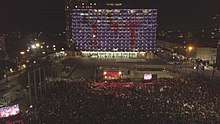Feminism in Israel
Feminism in Israel is a complex issue in contemporary Israeli society due to the varied demographic makeup of the country and the country's particular balance of religion and state issues.[1] For secular Israeli women, the successive campaigns for women's rights and equality reflect a similar timeline and progression as Western democracies. For Israeli Arabs, however, the issue of feminism is strongly linked to Palestinian causes. And for Orthodox Jews, selected women's rights and women's representation in the Israeli Parliament are issues that are only recently being debated.
| Part of a series of articles on |
| Jewish feminism |
|---|
 |
| Advocates |
| Groups |
| Orthodox Jewish feminism |
|
| Issues |
|
Historical development
First-wave
The manifestations of first-wave feminism in Israel began before statehood, during the Yishuv period. These early campaigns were rooted in the ideology of Israeli socialism. A feature of this era is the women who sought to be treated as equals, chiefly in the areas of agricultural labor in the kibbutzim and within the workers parties. This first wave of Israeli feminism reached its peak in the 1920s with the struggle to obtain the right to vote in local Yishuv institutions.[2][3]
Second-wave feminism
Second-wave feminism took somewhat longer to manifest in Israel. Questions concerning the need for a new women's rights movement began in the early 1970s, and in 1972, Israel's first radical women’s movement was established. Notable events during that era include the establishment of the Ratz political party ("Movement for Civil Rights and Peace") which won four seats in the 1973 Israeli legislative election.[3]
During this period, key early activists were American Jews living in Israel who organised consciousness raising meetings in Israel's major cities.[4]
In contemporary Israeli society

Arab Israeli feminism
Arab Israeli feminism emerged following Israel's second-wave feminism, criticizing the dominant discourse as ignoring the double discrimination experienced by the Palestinians of Israel, and demanded their own path to emancipation. Their initial actions concerned work, education, domestic violence. The general stance of Israeli Arab feminists is anti-colonial and sympathetic to Palestinian nationalism, however, no feminist “movement” has been constituted due to internal organizational fragmentation.[6] In Arab feminist literature, a common theme of discrimination concerns childhood experiences of boys and girls in the family.[7]
Writings on this trend of feminism tends to neglect the impact on the Israeli Druze community.[8]
Mizrachi feminism
As feminism in Israeli society developed, a distinction began to form between Ashkenazi (Jews of European origin) and Mizrachi (Jews of Middle Eastern origin) forms of feminism. A rift formed along ethnic lines, as Mizrachi activists felt excluded and marginalized from mainstream women's movements. The First Mizrahi Feminist Annual Conference was held in 1995, representing the formal recognition of Mizrachi feminism in Israel.[9]
Orthodox and Haredi feminism
In ultra-Orthodox Jewish communities, one of the first substantive attempts by religious women to organise along political lines was the establishment of the Lo Nivcharot, Lo Bocharot ("not elected, no vote") in 2012 which campaigned for the ultra-Orthodox political parties to allow women to join the party.[10] A subsequent initiative was the establishment of the political party U'Bizchutan organized by Haredi women.[11]
A major issue prompting efforts for Orthodox women's rights is the issue of agunot, women whose husbands refuse to divorce under Jewish law.[12]
Haredi feminism is still an slowly emerging trend but it is distinct from modern Orthodox approaches. Modern Orthodox and Religious Zionist efforts include issues relating to religious law such as the question of women prayer groups and access to public rituals such as dancing with the Torah scroll on Simchat Torah. By contrast, Haredi feminism has been concerned with the political sphere and does not address restrictions in religious ritual areas.[13]
| Wikimedia Commons has media related to Feminism in Israel. |
Legistlative responses
The Israeli government marks International Women's Day, as marked by the United Nations and other countries around the world, to commemorates the struggle for women's equality under the law. The Knesset has established a Committee on the Status of Women and Gender Equality which is responsible for promoting the status of women in social, economic and political affiars, and to address gender-based discrimination in Israeli society.[14]
See also
References
- https://fathomjournal.org/women-and-feminism-in-israel-women-in-israel-a-revolution-halted/
- Hanna Herzog, "Politics in the Yishuv and Israel", Jewish Women: A Comprehensive Historical Encyclopedia, Jewish Women's Archive, 1 March 2009.
- "Feminism in Contemporary Israel | Jewish Women's Archive". jwa.org. Retrieved 2019-03-17.
- Feldman, Y. S. (2000). From" The Madwoman in the Attic" to" The Women's Room": The American Roots of Israeli Feminism. Israel Studies, 5(1), 266-286.
- https://www.timesofisrael.com/30000-attend-tel-aviv-rally-in-protest-of-rising-violence-against-women/
- Marteu, É. (2012). Israeli and Palestinian feminisms: Postcolonial issues. Revue Tiers Monde, (1), 71-88.
- Levy, N. W. (2009). “… but it has its price”: Cycles of alienation and exclusion among pioneering Druze women. International Journal of Educational Development, 29(1), 46-55.
- Booth, M. (2011). Nazira Zeineddine: A Pioneer of Islamic Feminism, by Miriam Cooke.
- Dahan-Kalev, H. (2001, November). Tensions in israeli feminism: The mizrahi ashkenazi rift. In Women's Studies International Forum (Vol. 24, No. 6, pp. 669-684). Pergamon.
- Nathan Jeffay, "Israeli elections: Charedi women refuse to vote", The Jewish Chronicle, 10 January 2013.
- Miriam Krule (21 January 2015). "Ultra-Orthodox Women in Israel Launch Their Own Political Party". Slate. Retrieved 18 June 2015.
- Zion-Waldoks, T. (2015). Politics of devoted resistance: Agency, feminism, and religion among Orthodox Agunah activists in Israel. Gender & Society, 29(1), 73-97.
- Ross, T. (2016). Radical Feminism and a Theology of Jewish Autonomy: An Anatomy of Unexpected Alliances. Jewish Studies Quarterly, 23(4), 374.
- https://www.knesset.gov.il/lexicon/eng/intl_woman_day_eng.htm#:~:text=March%208th%20is%20International%20Women's,around%20the%20world%2C%20including%20Israel.
